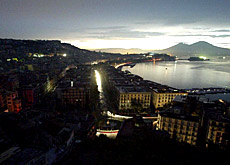Swiss need not fear the dark

Italy became the latest country on Sunday to suffer a massive power cut, joining the United States, Britain, Sweden and Denmark, which have all had electricity outages in the past two months.
Switzerland, though, seems likely to avoid a similar outage.
Swiss Electric, the umbrella organisation representing the country’s electricity suppliers, thinks that a blackout on the Italian scale is improbable.
Werner Graber, a member of Swiss Electric’s management board, told swissinfo that the quality of the Swiss network ensured that such a scenario was unlikely.
“You can never say never, but in Switzerland we have a very high density of networks and if one or two lines fail, it is still possible to transport the energy over other lines,” he said.
Graber’s view is shared by Stewart Gray, principal consultant with the Edinburgh-based Wood Mackenzie consultancy.
“In theory, a blackout could occur anywhere. Having said that, the Swiss system is less likely to have a failure than the Italian one, as Switzerland has higher levels of reserves built into the system,” he explained.
“Whereas Italy has for a number of years has been importing 15-20 per cent [of its electricity] from mainly France, Switzerland is self-sufficient.”
Monopoly
Swiss Electric confirmed that Switzerland does indeed produce enough electricity for its needs, 60 per cent of which comes from hydropower.
The fact that the national grid had not yet been liberalised also brought advantages, said Werner Graber.
“We think our system is in a very good state: the quality of the network is very high because we still have a monopoly situation in Switzerland. So the companies can spend enough money to keep the network in good quality,” he said.
Some analysts blame the liberalisation of the US market for the severe power shortages that plagued the country in the summer.
Graber drew no direct connection between liberalisation and blackouts, but he said there were ways to liberalise energy markets properly.
“If a country wants to liberalise its electricity market, it should realise the importance of the networks, which should be renewed and kept in good condition. [That is why] a strong regulator is needed to [make] money flow to networks.”
Local supplies
Switzerland’s electricity is run on a cantonal basis, with consumers having to buy power from a local supplier.
This effectively means that customers cannot shop around and choose their supplier.
But the lack of choice does not seem to bother the Swiss: last year they rejected a government proposal to liberalise the electricity market.
More than 52 per cent of voters came out against the initiative, which would have brought Switzerland into line with the rest of Europe.
Opponents to deregulation said the stability of the existing system had helped to defeat the proposal.
Italian connection
Sunday’s power cut left almost 57 million Italians without electricity for hours, and up to five deaths have been attributed to the blackout.
A Swiss company, Aare-Tessin for Electricity, admitted that a tree falling on a transmission line in central Switzerland had briefly disrupted supply to Italy on Sunday morning.
But it denied that the disruption was sufficient to plunge the entire country into darkness. Graber explained that a tree falling on a transmission line was not unusual.
“Trees can fall and they can fall on transmission lines. For the past month the transmission lines to Italy were on very high capacity, so if one line breaks, then the other lines have to take over the current which was flowing on the broken line,” he said.
At the time of the blackout, two lines from France into Italy were also disrupted, reportedly by storms.
Swiss blamed
However, the French power supplier said it swiftly remedied the situation and blamed the Swiss for the havoc in Italy.
Investigations into what actually happened and which company was ultimately responsible are continuing.
For Graber, apportioning blame fails to address the question at the heart of this weekend’s crisis, namely Italy’s own energy policy.
“Italy has an energy policy that lives from imports,” he said. “Every year consumption rises and it is not able to build new power plants.
“We have now reached a limit of capacity on the overhead lines between the north and south of the country, and so Italy has to think about changing its policy.”
swissinfo, Faryal Mirza
Italy imports between 15 and 20 per cent of its electricity, mostly from France, Switzerland, Austria and Slovakia.
Switzerland provides Italy with between eight and ten per cent of its total power.
Italy’s power supply from Switzerland was temporarily disrupted on Sunday after a tree fell on to a transmission line.

In compliance with the JTI standards
More: SWI swissinfo.ch certified by the Journalism Trust Initiative










You can find an overview of ongoing debates with our journalists here . Please join us!
If you want to start a conversation about a topic raised in this article or want to report factual errors, email us at english@swissinfo.ch.